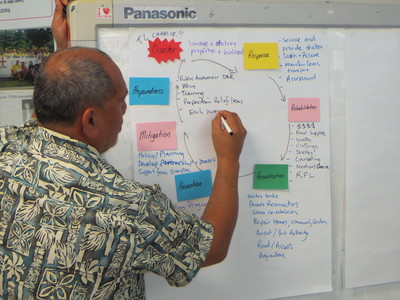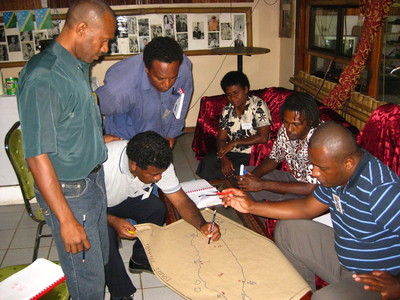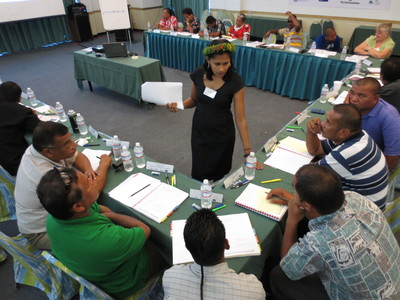
The Secretariat of the Pacific Community’s Disaster Reduction Programme is a leading provider of Disaster Risk Management training in the region.
Drawing on its previous partnerships with The Asia Foundation and USAID’s Office of Foreign Disaster Assistance, SPC provides support to Pacific Island Countries in the development, delivery and evaluation of DRM training in addition to training and mentoring DRM trainers from across the region to increase national DRM training capacity.
Training Courses
SPC offers a range of training courses which are delivered at the regional, national, sub-national and community level. Our courses are adapted to suit the national contexts of each Pacific island Country. Our long-standing courses include:
-
Introduction to Disaster Management
-
Initial Damage Assessment
-
Evacuation Centre Management
-
Disaster Risk Reduction
-
Emergency Operations Centres
-
Exercise Management
-
Risk Programme Management
-
Training for Instructors
-
Geographic Information Systems for Disaster Risk Management (Basic)
- Geographic Information Systems for Disaster Risk Management (Advanced)
We also offer one-off training to meet given needs. Examples of this include:
-
Disaster Risk Assessment Tools and Applications Training for Pacific Disaster Managers
-
Pacific Disaster Net User Training
Following this trainers are offered the opportunity to observe and then get hands-on with training delivery, supported by Master Trainers who help trainers prepare, back-stop the delivery and offer constructive feedback to improve trainer confidence and performance.
Institutionalising DRM Training
SPC works in partnership with National Disaster Management Offices in Pacific Island Countries to institutionalise DRM training within established training and education providers. Examples of this include Fiji’s Public Service Commission which now includes Introduction to Disaster Management and Initial Damage Assessment in its portfolio of training available to Public Servants. The Solomon Islands National University, Atoifi Adventist College of Nursing and Helena Goldie College of Nursing include an abridged version of the Introduction to Disaster Management and Initial Damage Assessment courses as part of the curriculum for all nursing students. In partnership with SPC, Fiji National University offers a full (four course) Post Graduate Certificate in Disaster Risk Management.
Meet the team
If you would like to find out more about DRM training in the region and how you can get involved please contact the team here at SPC. Alternatively you can get in touch with your National Disaster Management Office.
Kirstie Méheux - Senior Adviser, DRM Training and Capacity Building
Emele Bolaimaira -Training Materials Development Specialist
For details of Disaster Risk Management training happening in the region please visit Pacific Disaster Net
The DRP continues to support training and capacity building initiatives in PICTs. Training and capacity development in disaster risk management remains an important concern for national disaster agencies and for other key actors at national level in the region. There is a need to explore opportunities to maintain the current suite of training and to identify additional training opportunities that contribute to the strengthening of key agencies such as lands, meteorological and hydrological services, agriculture, health, and other stakeholders including NGOs and community groups.
TAF/OFDA Pacific DRM training programme
SOPAC continues with its commitment by maintaining its long standing relationship with The Asia Foundation and the USAID / Office of US Foreign Disaster Assistance (TAF/OFDA) Pacific DRM Training Programme (PDRMP). The PDRMP organizes a number of training courses throughout the Pacific targeting a broad range of participants. In addition to supporting national-level training PDRMP also provided instructor/trainer development workshops at the request of countries for specific courses: Introduction to Disaster Management (IDM), Initial Damage Assessment (IDA) and EOC. These workshops provided national trainers greater understanding of the critical elements of the individual courses.
An important addition to the suite of TAF/OFDA courses is a disaster risk reduction course. This training course is designed to reflect the paradigm shift from an emphasis on disaster management to a greater focus on risk reduction. The PDRMP will work closely with SOPAC and other stakeholders to finalise the development of the DRR course mindful of the potential target audiences at different levels within each Pacific country.
In addition to the training, TAF/OFDA and SOPAC have collaborated in the past with the United Nations Office for the Coordination of Humanitarian Affairs and the IFRC to identify Pacific islanders who received scholarships for post-graduate certificate qualifications in disaster management through the Swinburne University of Technology (SUT) in Melbourne, Australia. In 2008 SUT discontinued its programme and TAF/OFDA and SOPAC have since pursued a similar initiative with the Fiji National University. Recently, the FNU announced the establishment of two new Graduate Certificate Programmes in Disaster Risk Management and Emergency Health.
Over the next 3-years the Foundation will work with SOPAC in a partnering and mentoring capacity to enhance the organizational capability of SOPAC/CRP to manage DRM training and expand its own outreach and impact.
There are three main components to the program that will guide the work over the next three years, these are:
Component 1: Further strengthen PICs capacity for disaster risk management through training to enhance national-level preparedness and response systems and programmes;
Component 2: Strengthen SOPAC’s organizational and leadership capability for regional disaster risk management capacity development;
Component 3: Provide support to further empower at-risk communities to establish and maintain low-cost early warning and alert systems for disaster risk reduction.


